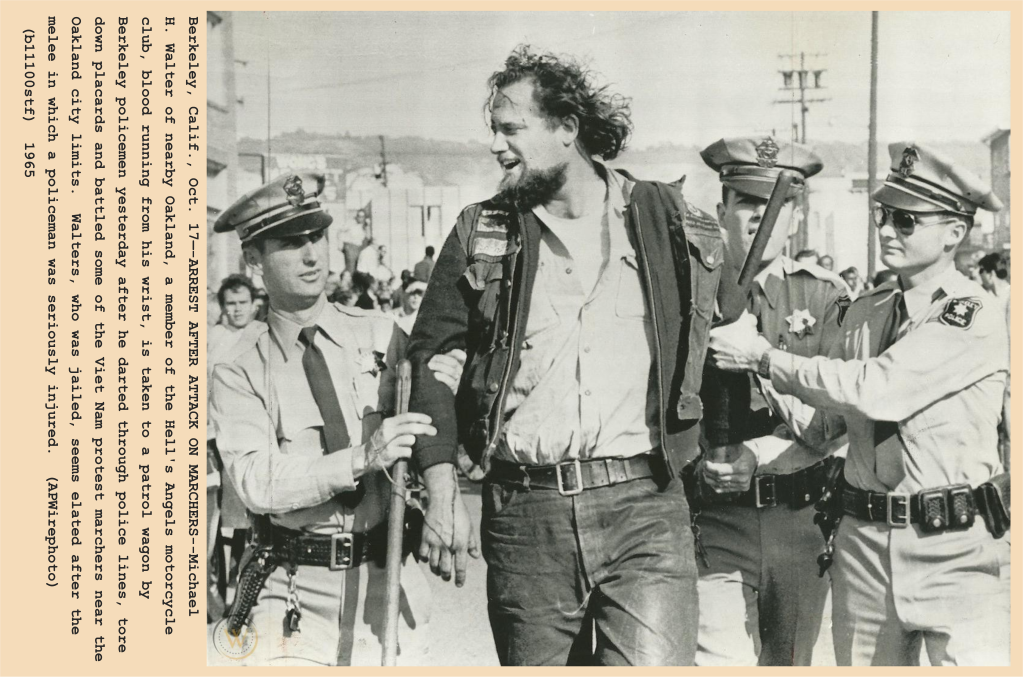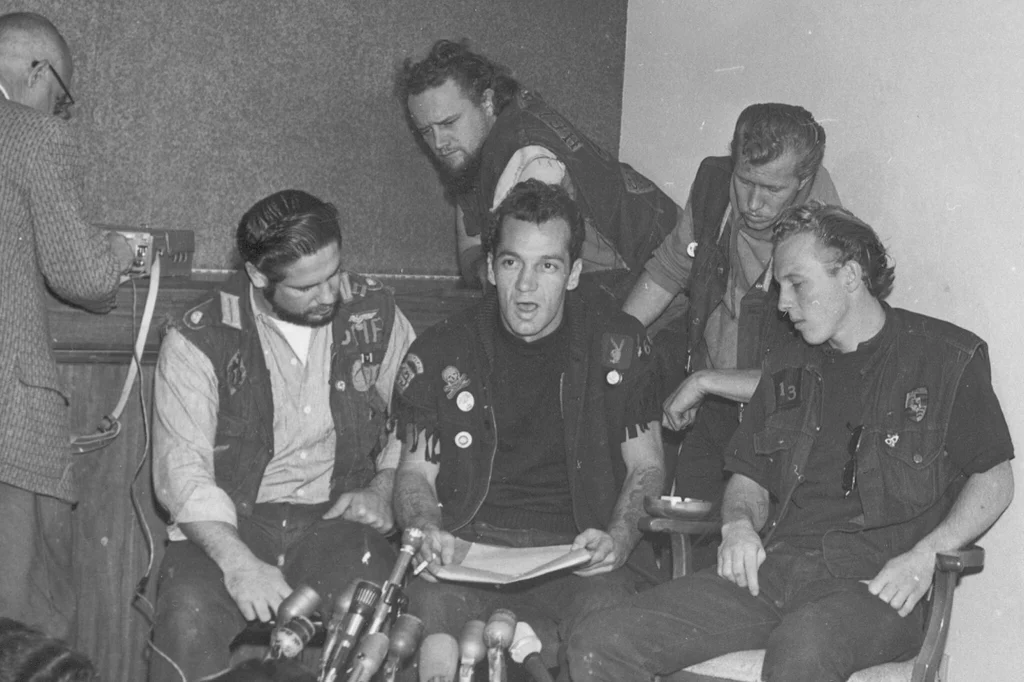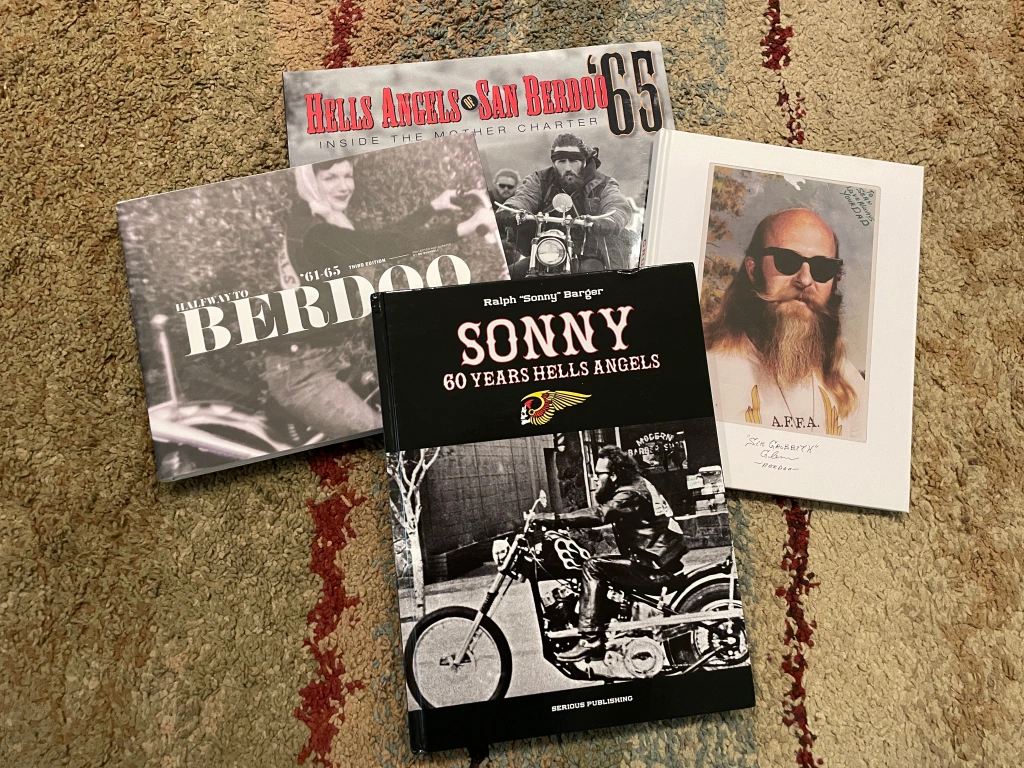
Sonny Barger joined the Hells Angels Motorcycle Club the same year I was born, and was still a member in good standing when he passed away on June 29th, 2022. That’s one long career!
Myself, I never met the man – to the best of my knowledge I never met any member of his club – but Barger was still a big influence in my life. He features prominently in Hunter S. Thompson’s Hell’s Angels: The Strange and Terrible Saga of the Outlaw Motorcycle Gangs (Random House, 1967) and parts of Tom Wolfe’s The Electric Kool-Aid Acid Test (Farrar Straus Giroux, 1968), and my nascent view of what it meant to be a motorcyclist – the life path I’d already chosen for myself – was informed by Barger’s and his brothers’ exploits. Not for me the ‘nicest people on a Honda’ as the infamous mid-’60s advert suggested. I would be a biker….
….and that’s what I did.
Aside from Evel Knievel, who was much more masochist than motorcyclist, Sonny Barger is assuredly the most famous biker in the world, and was in the news numerous times throughout his tenure. For example, after members of the Oakland chapter of the Hells Angels, which Sonny served as President, broke up an antiwar demonstration in October, 1965, Sonny held a press conference in which he foreswore violence against future protests because ‘Any physical encounter would only produce sympathy for this mob of traitors.’ He also read a telegram he’d sent then-President Lyndon Johnson, volunteering his club brothers for ‘behind the line duty in Vietnam’ as ‘a crack group of trained gorillas [sic]’ who would ‘demoralize the Vietcong and advance the cause of freedom.’


Sonny was also the voice of the Hells Angels after the disastrous Altamont Speedway concert in December, 1969, which resulted in the stabbing death of a eighteen-year-old African American named Meredith Hunter. Although accounts differ as to why they were present, the Angels had been sitting on the front edge of the low-slung stage, acting as a human barrier between the crowd and the performers. Hunter, who had been tossed off the stage by Hells Angels during a previous altercation, returned with a handgun and began waving it around, firing at least one shot into the crowd. Hells Angel member Alan Passaro stabbed and disarmed Hunter, who later died of his wounds.
The next morning, as the talking heads on local radio station KSAN attempted to unravel the chaotic stream of events, Sonny Barger called in and gave his club’s side of the story – the only official statement the club ever offered about the concert or the killing. Barger defended his patch holders, telling radio host Stefan Ponek ‘You can say anything you want and you can call them people flower children and this and that, and there was three hundred thousand people there approximately or whatever they say, and I guarantee you that the largest majority of them were there to have a good time, but there was a couple thousand of them that was there looking for trouble.’
Brushing aside the host’s attempt to cut in, Barger went on to say ‘Some of them people out there ain’t a bit better than what some of the people think of the worst of us, man, and it’s about time they realized it….’
The incident at Altamont and Barger’s telephone call to the radio station were captured on film by documentarians Albert and David Maysles and Charlotte Zwerin, and the resulting movie, Gimme Shelter, was released in 1970. One week after its premiere Hells Angel Alan Passaro went on trial, charged with murdering Meredith Hunter. However, when the film was played in court, it clearly showed Passaro acting in defense of self and third parties, and he was acquitted of all charges.
Given the Hells Angels’ hard-won reputation as thuggish brutes prone to violence and lawlessness, Barger was preternaturally media savvy – an excellent spokesman for his club and a wily self-promoter. He finagled parts for himself and other Angels in a couple of biker films – Hells Angels on Wheels with Adam Roarke and future Easy Rider star Jack Nicholson, and Hells Angels ’69, starring ’60s heartthrob Jeremy Slate, who later played the biker gang leader in The Born Losers.
He was also in the headlines for his numerous arrests, on charges ranging from drugs and weapons charges to conspiracy and murder and, while acquitted of the more serious charges, still spent several years in prison. During this time he gave several interviews to motorcycle magazines, including two for Supercycle, published in February and December, 1979.

During these years, and despite his numerous legal woes, Sonny discovered that he was a marketable commodity. The ‘Free Sonny’ t-shirts his wife sold during his incarceration were wildly popular, and other merchandise soon followed, but he really hit the jackpot when he teamed up with writers Keith and Kent Zimmerman and penned his memoir, Hell’s Angel: The Life and Times of Sonny Barger and the Hell’s Angels Motorcycle Club (William Morrow, 2000).
The book quickly became a best-seller, so he followed up with two biker-themed crime novels also co-authored by the Zimmerman Brothers – Dead in 5 Heartbeats and 6 Chambers, 1 Bullet (William Morrow, 2004 and 2006). He released a collection of road tales titled Ridin’ High, Livin’ Free: Hell-Raising Motorcycle Stories (William Morrow, 2003) and Freedom: Credos from the Road (William Morrow, 2005). Finally, with Darwin Holstrom, he co-authored Let’s Ride: Sonny Barger’s Guide to Motorcycling (William Morrow, 2010) in which he dissed American motorcycle manufacturer Harley-Davidson, for decades the only motorcycle Hells Angels were permitted to ride. In what can only be seen as heresy by those loyal to the brand, Barger wrote:
In terms of pure workmanship, personally, I don’t like Harleys. I ride them because I’m in the club, and that’s the image, but if I could I would seriously consider riding a Honda ST1100 or a BMW. We really missed the boat by not switching over to the Japanese models when they began building bigger bikes. I’ll usually say “Fuck Harley-Davidson.”
Sonny Barger
Sonny’s final contribution to the literature of motorcycling seems to be his massive scrapbook-styled tome, Sonny: 60 Years Hells Angels, published by the French imprint Serious Publishing in 2017. Copies are currently listed on Amazon at $357 USD! 😳 I swear, I did not pay even a fifth of that for my copy! 😎

Anyway, here is the first of the two 1979 interviews:






If enough folks are interested, I’ll post the second interview soon, along with some other articles about this and other clubs.

Can you post some more pictures from the 1979 feb. of Supercycle? There is a picture of my dad in that magazine but I lost the copy I owned.
D, I apologize. I just this moment saw your message. It was pending my approval, but WordPress didn’t notify me about it. Purely chance that I saw it this evening.
Anyhoo, I’ll be glad to post those. Do you recall the page number or what the article was about? Let me know and I’ll get them out for you ASAP.